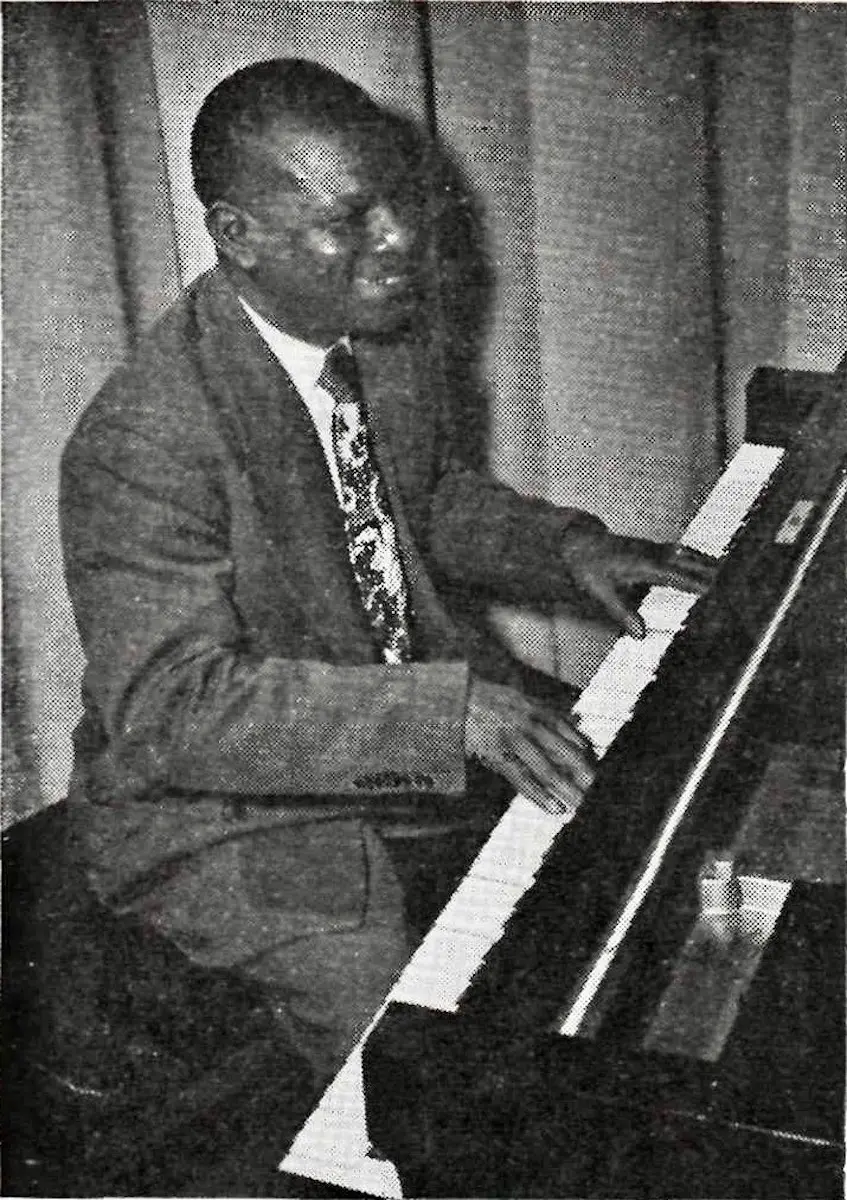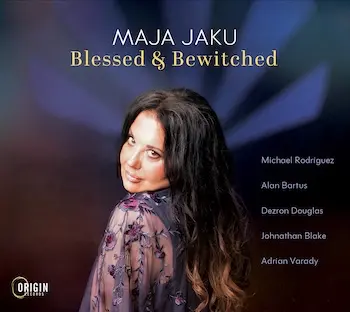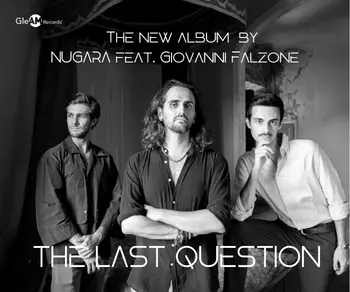
This is one of a series of taped interviews with musicians who are asked to give a snap opinion on a set of records played to them. Although no previous information is given as to what they are going to hear, they are, during the actual playing, handed the appropriate record sleeve. Thus in no way is their judgement influenced by being unaware of what they are hearing. As far as possible the records played to them are currently available items procurable from any record shop.
Alton Purnell, that jovial pianist from New Orleans, is so much a close native of that city that he was actually born in Preservation Hall. Best known for his work with the bands led by Bunk Johnson, George Lewis, and Kid Ory, his piano playing comes as the perfect illustration of how the role of New Orleans pianist should be played – strongly rhythmical and strictly in time. Like most musicians from his native city, Alton Purnell radiates humour and happiness, but as will be noticed from his comments, it is not only music from and by New Orleans musicians that have impressed him most. – Sinclair Traill
La Salle St. Breakdown. Jimmy Yancey. Riverside RLP 1028
This kind of music I’ve been hearing all my life – played in honky tonks and different places in New Orleans. Some of the best was even played by people who nobody ever heard of, for this kind of piano was played all over New Orleans when I was a kid. I play a little like that at times, in fact that was the type of music I started out playing. The piano in New Orleans some 35 or 40 years ago was all the go, an’ there were a gob of pianists around in those days – most every house had a piano in it. There was no radio or television in those days, so what happened was this. New Orleans, you know, is divided into Wards, and in every Ward they had someone who they thought was their best piano player. One piano player would stop at a house and start playing and people who would come in off the street to listen. Then someone would send for another piano player from a different Ward, and then the party might go on for four or five days. The winner was a matter of public opinion. When I started coming up, there was this little guy who taught me, Burnell Santiago, who was a nephew of Willie Santiago. His brother Lester is now with Paul Barbarin’s band. The whole family were very gifted musically, but Burnell was a genius. He would win every contest – he could beat the jazz pianists and the honky tonk ones. He could play any kind of music and he could beat them all. He could have had a wonderful career in music, but somehow he didn’t care to play for money. Anyone in New Orleans will tell you that he was the greatest. Pity he never made a record.
Of Louis Armstrong: ‘All those things he did, he created, they weren’t known to any other musician, even the greatest’
That’s A Plenty. Lennie Felix. Columbia 33S 1144
That’s very good, very good indeed. His piano style is between ragtime and jazz – right between. You very seldom hear anyone play like that, it’s right in between. He manages to give that a genuine ragtime flavour and yet plays things that are in jazz. It’s very clever. There is always a big difference between a band pianist and a soloist, and he’s a real soloist. But he’s a real good piano player, I can tell that!
Mahogany Hall Stomp. Louis Armstrong at Town Hall. Victor RD 7659
Now I know all the people on that record except the piano player, Charlie Beal, who I see it says comes from New Orleans. Funny, I shouldn’t know him. I was in the same band on Sunset Strip with Minor Hall when he died.
It was a very sad thing. He got sick and when the doctors found out they couldn’t save him, they let him out of hospital and brought him to hear the band. He just rolled back his eyes for I guess he knew he would never play again. It was sad.
As for the others, well Louis is my idol and always has been. I knew him in New Orleans and he was always a good trumpet player even from the time he was in that home. When just a kid he used to play the parades and things and he was wonderful then – there will never be another Louis! I love that man. He’s not only a great trumpet man, he’s also a great person. And he’s more creative than any person who ever lived. All those things he did, he created, they weren’t known to any other musician, even the greatest. Louis gave something to the world, and every trumpet player who has ever played owes something to what Louis did – and they still do for that matter. Ory played well in there I thought. I was with the last band he had at the Beverley Cavern and should have made that last record with him, but I got took sick.
‘I think it is remarkable how these English boys have managed to get quite a bit of that New Orleans feeling’
Winin’ Boy. Keith Smith’s Climax Band. 77 LEU 12/9
I think it is remarkable how these English boys have managed to get quite a bit of that New Orleans feeling. I really do, because now even in the States there aren’t many musicians who can play music with as much New Orleans feeling in it as some English boys show. I don’t know all these musicians on this record, but it is quite good, the drummer isn’t very relaxed, but the feeling is there. You know when I play with them I think I am able to give them that push they need. It’s the push that’s wanted; they get a bit behind that beat, and need driving, if you see what I mean. But they are doing remarkably well, considering most of them have never even been in the States – just picked it up from records.
Turtle Twist. Jelly Roll Morton. HMV DLP 1044
I never met Jelly Roll, at least I may have seen him when I was a very small boy in New Orleans. But he was a great musician and I guess could do at least half of all those things he said he could do, and I understand all those things he talks about on those records. I understand the life he lived, because this was the life those piano players lived down there. He was a sort of real hustler, played pool and the cards. And it was real, those things he says; it was the real life he led in and around New Orleans and in those little sawmill towns, where he’d play pool and pick up a few hundred dollars here and there. They’d have these big skin balls, an’ the women and the different things – an’ you’d have to be careful ’cause a lot of those guys were bad, real mean. That skin ball I spoke of is the game called skin. All the good players get together, with plenty money, then this is called a skin ball. A card game, but they were skinned if they didn’t have the real money to put up for the game. Those fellers who couldn’t gamble real good, they wouldn’t get in these kind of games. It was too big for them. But the big gamblers, whether they won or lost, they considered they had a ball and they enjoyed themselves. And Jelly brings all these things back to me when I’m listening to him here. I was but a kid and I wished I could be a man, ’cause I was a real gambler too, you know. I don’t play any more these days, but these were the things we used lo do.
Undecided. Earl Hines – Spontaneous Explorations. Stateside SL.10116
I know him very well. I played at the Hangover, when Earl Hines was there. But I met him all over, Chicago, New York and other places. I hear him whenever I can – only wish I could play as good as he does – wonderful. I used to hear him when he had that band with Jimmy Archey, Darnell Howard and the others and he played so much piano. But he has always been good. I never would get tired of listening to Earl Hines. One of the greatest of all piano players.
Ace In The Hole. Lizzie Miles. Melodisc EPM 7-55
Well, I was raised with Lizzie’s half brothers, Maurice Morand and Herb Morand. I remember when Lizzie first decided to make a come-back, she asked George Lewis for a job, but for some reason he didn’t give it to her. But at this place the Mardi Gras Lounge, when she was working there, we were working there too. Joe Robichaux was playing for her and they were doing the intermission for the George Lewis’ Band. A great singer and she does this number fine. Ace In The Hole – you know what that means? It is poker, but it doesn’t mean that here. It was a place you could get money when you went broke. If anything went wrong, you had your ace in the hole, where you could get staked, a little standby where you had something for a rainy day. Lizzie was a sweet, sweet, sweet person, and could she cook! She was one of the best cooks in all New Orleans.
Jitterbug Waltz. Art Tatum. Ember EMB 3326
You know when you speak of Tatum, you have to put him in a different class to any other musician. What a piano player! Right in a different class! You just listen to Tatum and you think, well, what’s the use, I ain’t never goin’ to play like that, whatever I do. I was in New York and I used to go and listen to him every night. I wouldn’t miss a single night: he and Billie Holiday were working in the same place on 32nd Street. He plays so much piano that other people just can’t reach that high, so one is inclined not to think about him as just a jazz piano player; one thinks about him as genius. You know that you are never going to be able to do what he did, for he played so fast that you couldn’t even learn anything from him. But you know, this little Burnell Santiago I spoke about earlier, he was on this style. He would take this record and he would listen to it and then he’d say, now I’ll play like Art. And he would then play just like Art Tatum. He could play anything he heard. I remember he was working as an intermission pianist one time, and some conductor of the symphony who was working at the auditorium came by. Now everybody in New Orleans knew that Burnell was great, so the boss he came over and told Burnell there was a long-haired conductor come in, so you show him something. And Burnell played a classic, and the man he jumped up out of his seat and shouted “It’s impossible for a man to play like that!” And that’s how good Burnell was.



